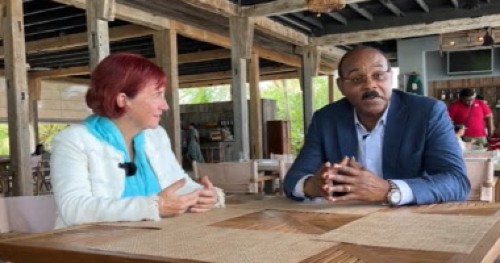Antigua and Barbuda Chosen for Global Launch of OceanShot Coral Conservation Project
ST. JOHN’S, Antigua – Prime Minister Gaston Browne has welcomed the decision to choose the island for the global launch of ocean conservation efforts to safeguard against the impacts of climate change.
 Prime Minister Gaston Browne discussing the launch of the project with an official from the reef restoration project OceanShot (CMC Photo)“This project has multiple benefits. There are environmental benefits, social benefits, economic benefits and we are very happy to be part of this initiative. It is a very exciting time and Barbuda has proven to be one of the most climate resilient islands in the world,” Prime Minister Browne said.
Prime Minister Gaston Browne discussing the launch of the project with an official from the reef restoration project OceanShot (CMC Photo)“This project has multiple benefits. There are environmental benefits, social benefits, economic benefits and we are very happy to be part of this initiative. It is a very exciting time and Barbuda has proven to be one of the most climate resilient islands in the world,” Prime Minister Browne said.
Barbuda was chosen for the first deployment of tailor-made coral modules from the pioneering coral reef restoration project OceanShot in what is expected to be an innovation used globally.
OceanShot was created by climate scientist and marine biologist Dr Deborah Brosnan and philanthropist John Paul DeJoria.
Prime Minister Browne, who was in Barbuda Monday for the event, hailed it as a crucial endeavor in the battle against climate change.
“We have been at the forefront of climate advocacy. The Caribbean islands we have been on the front line for change and we have to continue to advocate strenuously for countries to reduce their carbon emissions,” he said, noting for example that while Barbuda’s carbon footprint “is negligible…we are taking further measures to reduce the carbon footprint”.
He said Barbuda is relying on solar energy for at least 15 hours daily “and within the next 18 months Barbuda will be fully supplied by solar energy, so no fossil fuel….so that Barbuda will become, perhaps the most climate resilient country in the world.”
The coral modules combine both built structure and living coral. They are architecturally designed to restore a once-thriving ocean ecosystem, and to protect shoreline and ocean communities from the ravaging impact of storms and sea level rise, as well as to revive ocean-dependent local economies. This project is scalable for global implementation.
Antigua and Barbuda was chosen for the initial coral module deployment because it illustrates the problem facing millions around the world. With the majority of its corals dead, the coastline is vulnerable to storm surge, erosion and sea level rise. A living coral reef breaks over 90 per cent of a wave’s energy, helping to keep sand on the beach and reduce run-up.


